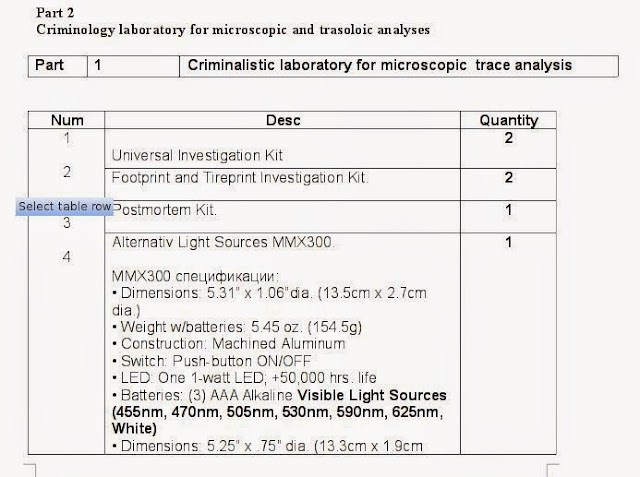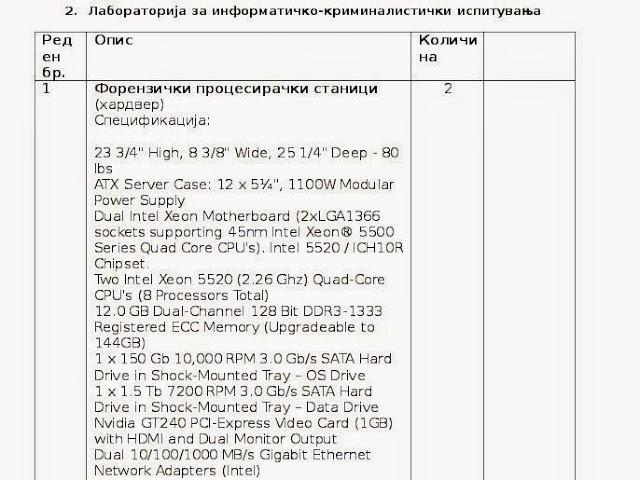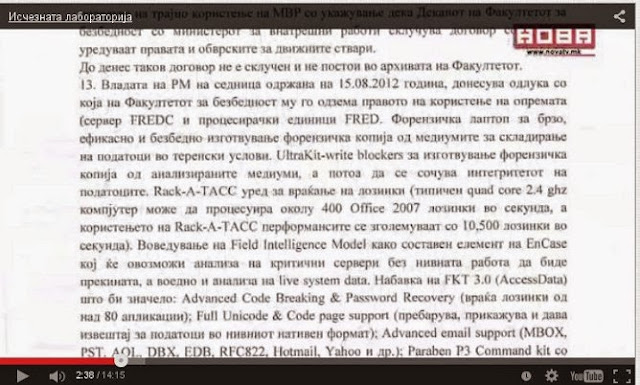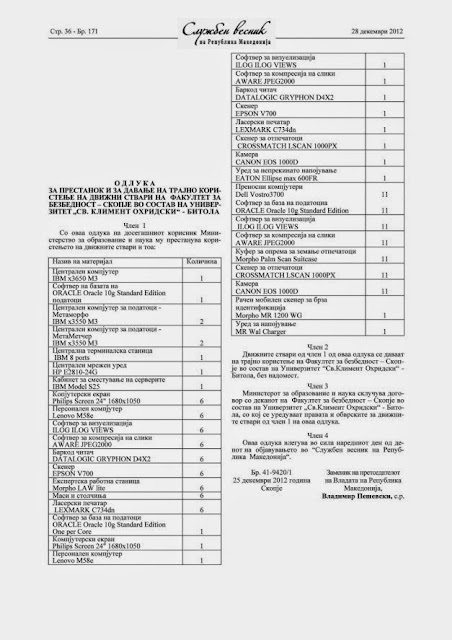tl;dr One procurement, one equipment, three affairs.
What is common among the news reports of NovaTV (1 и 2), Fokus (1, 2, 3 и 4) and Bure Vesnik (1)?
They all write about suspicions procurement of equipment. Unfortunately they all assign different properties and usage to the same equipment.
It all begins with a news report on NovaTV. The first part of the news story is OK. The public is being informed about a criminal complaint filed for some equipment that that is allegedly missing from th Faculty of security in Skopje, a subsidiary of UKLO - Bitola.
In the news report on NovaTV professor Frosina Remenski describes the missing equipment: an electronic microscope, AFIS system and digital communication surveillance technology. The AFIS system was bought through the tender No. 43/2010. The other two were procured in different procedures: No. 33/2010 for the electronic microscope and No. 40/2010 for the digital communication surveillance technology.

source— e-nabavki.gov.mk

source— e-nabavki.gov.mk
At the moment when the alarm is sounded at UKLO the description of the equipment is known by one professor and probably an expert too, representatives from Transparency International and journalists. Yet, the alarm does not include danger from illegal production of biometric documents.

source— novatv.mk
However, already in the second story published by NovaTV there are speculation about equipment procured for the state television MRT. It is a speculation because the evidence offered for that procurement is "An announcement for contract for tender“ “ (screenshot from NovaTV page) clearly and unambiguously says that the procured part is just one laboratory from the tender which is divisible i.e. has different and unrelated parts as far as the bidding and buying goes. When one reads what NovaTV writes: — „Ministry of educatoin was buying crime and forensic labs for the Macedonian radio-television."-one gets the impression that NovaTV did not click on the tender documentation where it is stated that the parts of the tender planned for MRT are a studio and a audio-video lab.
After this the story is taken on by Bure Vesnik. In theirs research they too speak of the missing UKLO equipment and suspicious procurement practices. They provide screenshots from the Macedonian official gazette containing detail list of the equipment.
This time, however, even we can clearly read what is the equipment, the news report insists that this is a surveillance equipment. A quick Google search will easily dispute that: an electronic microscope (33/2010) is a microscope, Morpho's AFIS is a forensic database (43/2010) and FRED is a mobile forensic station (40/2010) —probably something like the tools they show on CSI when they do a their work outside.
Finally, Fokus takes the story of the same equipment. Suspicious procurement practices, Universities, deans and the same equipment. It is the same equipment that a while ago was surveillance equipment. Now the AFIS system becomes something with which one can produce biometric passports and identity cards.
However, Fokus does the same mistake as NovaTV. Without checking the documentation for the 43/2010 tender -- where it is clear that one AFIS is being procured, they claim that three were bought and two of them are missing.
For clarification: What is AFIS?
We constantly read that there were three AFIS and that two are missing. Where are they? When I read this, and before I knew that AFIS is an acronym for Automated Fingerprint Identification Systems, I had the idea that we are talking about three devices -- let's say three printers -- and two of them are gone.
In fact, AFIS plenty of equipment. Only the one for which we are sure that was bought, according to the list from the official gazette, has (if I counted correctly) 104 pieces of individual equipment including tables, chairs and cabinets.

source— burevesnik.org
Suddenly, the claim that two AFIS systems are missing seems very strange. In fact, if two are really missing, we are missing two whole rooms of equipment. I do not want to say that two rooms full of equipment can not be stolen. They can be, but at least there should be more to support that claim that a reference towards procurement documentation which looks like no one has read.
Conspiracy theory time
Like they say anything is possible. Laptops from the FRED purchase can be used for surveillance, which is true also for any ordinary laptop. Printers and cameras bought with the AFIS can be used for making biometric documents, which is true also for any printer and camera (Macedonian readers will remember the cheap cameras used at the Identity cards boots). It is possible that the whole documentation for the 43/2010 tender is fabricated and fake. And all of the other 200 university procurements for which Bure Vesnik claims that are surveillance equipment shopping may have fake documentation.
However, the journalists so far failed to offer any source that three AFIS systems were bought. As far as I know they failed to offer an analysis of what was sought, bought, delivered and installed with the tenders 20/2010, 25/201, 26/201 33/2010, 34/2010, 40/2010, 41/2010, 43/2010, for all labs for all public institutions
Anything is possible.
But we can only judge on what we can research and confirm.
Previously on the same topic:
Following the traces of the journalistic research
The metadata in the photos of the passports
Update 8.12.2014: The text was fully published in Oknohttp://okno.mk/node/42899